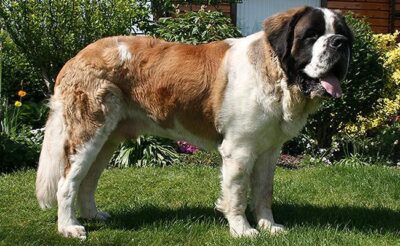The weight of Saint Bernards cannot be overemphasized because they are a large breed of dog that is known for its powerful and majestic appearance. Their weight and size make them a formidable presence and an impressive sight to behold. Despite their large size, Saint Bernards are known for being gentle and friendly, making them great companions for families and individuals.
Saint Bernards can weigh anywhere from 120 to 260 pounds. Males of this breed tend to be larger than females, with adult males typically weighing between 140 and 180 pounds while adult females typically weigh between 120 and 140 pounds.
Some Saint Bernards bred specifically for the show ring may be even larger, weighing up to 260 pounds.
It is important to note that Saint Bernards are a large breed, and as such, they have specific needs regarding nutrition and exercise. They are prone to certain health issues, such as hip dysplasia and bloat, that are more likely to occur in larger dogs.
Therefore, it is essential for the owners of this breed to provide them with proper care, including a healthy diet and regular exercise, to maintain their weight and overall health.
Weight of Saint Bernard

Saint Bernards are a large breed of dog and can weigh quite a bit. Adult Saint Bernards typically weigh between 120 to 260 pounds. Males tend to be larger than females, with adult males typically weighing between 140 and 180 pounds and adult females typically weighing between 120 and 140 pounds.
However, it is worth noting that there can be considerable variation in weight within the breed. Some Saint Bernards bred specifically for the show ring may be larger and weigh up to 260 pounds, while working Saint Bernards may weigh less. It is important to remember that the weight of a Saint Bernard should not be the only factor considered when assessing their overall health and well-being.
Regular vet check-ups, a well-balanced diet, and adequate exercise are also crucial for their overall health.
What is the average weight of a Saint Bernard?
Generally, the average weight of Saint Bernard weighs between 140 to 180 pounds. Adult males typically weigh in the upper range of this range, around 180 pounds, while adult females typically weigh closer to the lower end of this range, around 140 pounds.
It is important to note that these weight ranges are averages, and considerable variation can occur within the breed. Saint Bernards is a large breed, so their owners must provide them with proper care, including a healthy diet and regular exercise to maintain their weight and overall health.
Additionally, a regular vet check-up will help monitor their weight and ensure it is within a healthy range. It is important to remember that a healthy weight should not be the only consideration for Saint Bernard’s overall health and well-being, as many other factors, such as general physical and mental condition, diet, exercise, and regular vet check-ups, contribute to a dog‘s overall well-being.
How much should a fully grown Saint Bernard weigh?

A fully grown Saint Bernard should weigh between 140 to 260 pounds for males and 110 to 180 for females. It’s important to note that these are average weight ranges, and there can be variation among individual dogs.
It is important to remember that weight alone should not be used as the sole indicator of a healthy Saint Bernard. Proper nutrition, exercise, and veterinary care are all critical factors in maintaining a healthy weight and overall well-being.
Is my Saint Bernard overweight or underweight?
To determine if your Saint Bernard is overweight or underweight, it’s best to consult a veterinarian. They will be able to assess your dog’s body condition and give you a professional opinion on their weight.
A veterinarian will use Body Condition Score (BCS) to check if the dog is underweight, healthy, or overweight. It’s a visual assessment that considers the dog’s shape, muscle tone, fat cover, and overall appearance.
A healthy BCS for Saint Bernard is typically between 4 and 5 out of 9. If your Saint Bernard has a BCS below 4, they may be considered underweight; if they have a BCS above 5, they may be considered overweight.
What is a healthy weight range for a Saint Bernard?

On average, a healthy weight range for a male Saint Bernard is between 140 to 260 pounds, and for female, 110 to 180 pounds. It’s important to note that these are just general guidelines, and it’s always best to consult a veterinarian to determine the ideal weight for your individual Saint Bernard.
It is also important to remember that weight alone is not a perfect indicator of overall health. A dog within a healthy weight range can still have health issues, while a slightly overweight or underweight dog may still be healthy.
Other factors such as muscle tone, overall body condition, and overall health should also be considered when determining a healthy weight range for a Saint Bernard.
Can a Saint Bernard’s weight affect their health?
Saint Bernard’s weight can have a significant impact on their overall health. Being overweight or underweight can lead to many health problems for these large dogs.
Being overweight can strain Saint Bernard’s joints and bones, leading to arthritis, hip dysplasia, and other orthopedic issues. Overweight dogs are also more likely to develop diabetes, high blood pressure, and other metabolic issues. In addition, an overweight Saint Bernard may have a decreased lifespan.
On the other hand, being underweight can also be a problem for Saint Bernard. Underweight dogs may have a weaker immune system, making them more susceptible to illness and infection. They also may have less energy and endurance, affecting their quality of life.
Additionally, underweight dogs may have difficulty maintaining a healthy body temperature, which can be particularly dangerous in cold weather.
How do I know if my Saint Bernard is at a healthy weight?

There are several ways to determine if your Saint Bernard is at a healthy weight. One of the most reliable methods is to consult a veterinarian, who can assess your dog’s body condition and give you a professional opinion on its weight.
Another way to determine if your Saint Bernard is at a healthy weight is to use the Body Condition Score (BCS) system. This system uses a visual assessment to evaluate the dog‘s shape, muscle tone, fat cover, and overall appearance. A healthy BCS for a Saint Bernard is typically between 4 and 5 out of 9. If your Saint Bernard has a BCS below 4, they may be considered underweight, and if they have a BCS above 5, they may be considered overweight.
Furthermore, one way to determine if Saint Bernard is at a healthy weight is by looking at their ribcage, spine, and hip bones. Ideally, these bones should be easily felt but not seen. Your dog may underweight if you can see the ribcage, spine, or hip bones. Your dog may be overweight if you cannot feel these bones.
What factors can affect a Saint Bernard’s weight?
Several factors can affect a Saint Bernard’s weight, including diet, exercise, and overall health.
Diet is one of the most significant factors in Saint Bernard’s weight. If they consume more calories than they burn, they will gain weight. Conversely, they will lose weight if they are not getting enough calories. It’s important to feed your Saint Bernard a well-balanced diet that provides them with all the necessary nutrients and to adjust their food intake as needed based on its activity level and weight.
Exercise is another key factor in Saint Bernard’s weight. Regular exercise helps to keep the dog‘s metabolism active and burns off calories. Saint Bernards need a lot of space to move and play, and not getting enough exercise can lead to weight gain. Keeping them active and engaged through regular walks, runs, and playtime can help them maintain a healthy weight.
Finally, overall health can also affect Saint Bernard’s weight. Certain health conditions, such as thyroid problems, can cause weight changes, and medications can also affect a dog’s weight. Regular visits to the veterinarian can help identify and address any health issues that may be impacting your dog‘s weight.
How can I help my Saint Bernard reach a healthy weight?

You can take several steps to help your Saint Bernard reach and maintain a healthy weight.
The first step is to consult a veterinarian to determine your dog‘s ideal weight and develop a personalized diet and exercise plan. Your veterinarian can also evaluate any underlying health conditions affecting your dog’s weight and guide how to address them.
The second step is to monitor your Saint Bernard’s food intake and adjust it as needed. Feed them a well-balanced diet with all the necessary nutrients, and monitor the calories consumed. Avoid giving table scraps and keep track of the treats and snacks you give them.
The third step is ensuring that your Saint Bernard is getting enough exercise. Regular exercise can help keep the dog‘s metabolism active, burn off calories and maintain muscle tone. Saint Bernards need a lot of space to move and play, and not getting enough exercise can lead to weight gain. Keeping them active and engaged through regular walks, runs, and playtime can help them maintain a healthy weight.
It’s important to remember that weight loss should be gradual, not rapid, and to monitor your dog‘s progress and make adjustments as needed. Also, a consistent and daily diet and exercise routine can help maintain a healthy weight in the long term, in addition to regular check-ups with your veterinarian.
What is the ideal weight for a Saint Bernard according to breed standards?
The ideal weight for males the weight standard for a Saint Bernard is between 140-180 pounds (63-82 kg), and for females, 120-140 pounds (54-64 kg). These are the commonly accepted weight range for the breed in most kennel clubs.
It’s important to note that these standards are just guidelines, and the weight can vary among individual dogs. The most important thing is that the dog is healthy and that their weight is appropriate for its body structure, muscle tone, and overall health. Consult with a veterinarian to determine the ideal weight for your individual Saint Bernard and to develop a personalized diet and exercise plan to help them achieve and maintain a healthy weight.
Can a Saint Bernard’s weight vary depending on their age and sex?

Saint Bernard’s weight can vary depending on their age and sex.
In terms of age, puppies and adolescent Saint Bernards will naturally weigh less than fully grown adults as they are still growing and developing. Their weight will increase as they mature, reaching their maximum weight at around 2-3 years old.
However, it’s important to consult with a veterinarian to determine a healthy weight for your Saint Bernard at each stage.
As for sex, males are generally larger and heavier than females, with males weighing between 140 and 260 pounds and females weighing between 110 and 180 pounds. Female Saint Bernards will typically be smaller and lighter than males, so their ideal weight range will also be less.
Does the weight of a Saint Bernard vary according to the size variation within the breed?
The weight of a Saint Bernard can vary depending on the size variation within the breed. Saint Bernards are a large breed of dog, and their size can vary depending on the specific bloodline or breeding program. Some Saint Bernards may be larger or smaller than the breed’s standard weight ranges.
There are two types of Saint Bernards, the Alpine or Swiss-type and the Bernese type. The Alpine or Swiss type is taller and leaner than the Bernese type, which is shorter and heavier. The Alpine or Swiss type typically weighs between 140-180 pounds, while the Bernese type can weigh between 170 to 260 pounds.
Conclusion
In conclusion, the weight of a Saint Bernard can vary depending on the individual dog and its sex, age, size variation, and overall health. The breed standard for the weight of a Saint Bernard is between 140 and 260 pounds for males and 110 to 180 pounds for females, but this can vary depending on the specific bloodline and breeding program.
It’s important to consult with a veterinarian to determine the ideal weight for your individual Saint Bernard and to develop a personalized diet and exercise plan to help them achieve and maintain a healthy weight.
Being overweight or underweight can lead to many health problems for these large dogs, so monitoring their weight and providing them with proper nutrition, exercise, and veterinary care is crucial for their well-being.


